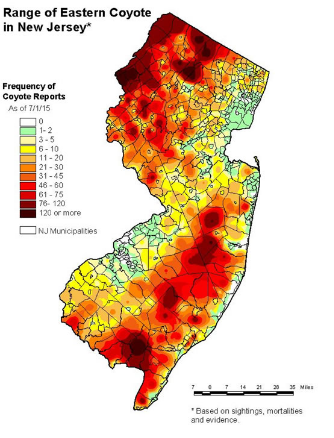Man Attacked By Coyote on Long Valley Trail

Game & Fish
January 25, 2017
 On Wednesday January 11th, a 66 year old man was attacked by a coyote on the popular Columbia Trail, Long Valley NJ according to WRNJ Radio.
On Wednesday January 11th, a 66 year old man was attacked by a coyote on the popular Columbia Trail, Long Valley NJ according to WRNJ Radio.
In an update of the same WRNJ Radio story it was confirmed by the state that the coyote in question was tested positive for rabies and that the man has been notified of the results. The Police made the following statement regarding possible trail closures:
“As of now, we are considering this an isolated incident, so the area is still open to the public” (WRNJ Radio).
There was reason to suspect that the animal had rabies even before the release of the state tests. For one thing, the man was with two other adults and some dogs during the attack (WRNJ Radio). No sane animal would approach such an intimidating group. Long Valley resident and WMCHS student Krystyna Constantino claims to have witnessed a peculiarly behaving coyote roaming around her neighborhood:

“As I was driving along, I noticed a large, greyish black animal wandering back and fourth in a corn field. I actually stopped my car to try and get a picture. I assume it was rabid due to its strange behavior.”
Suzi Faulkner of the WMC Girl’s Cross Country team who frequents the trail with the team states her opinion:
“I think that it is an alarming situation, but I will continue to go on the trail with more precaution!”
The Long Valley area is known for its farms, scenic hikes and wildlife. For a Long Valley resident, to see a small herd of deer casually walk through their yard or a black bear rummage through their garbage is not uncommon. None of these animals, however, have been known to attack.
The map to the right shows the concentration of the northeastern coyote in New Jersey. Morris County is in the 20-120 range for Coyote reports.
What does this mean for Long Valley residents? Although this does not pose a detrimental threat to our community, it does serve as a warning for how we conduct ourselves around potentially dangerous wildlife. Listed below are some guidelines from the NJDEP regarding coyote encounters:
- Never feed a coyote.
- Although extremely rare, coyotes have been known to attack humans. Parents should monitor their children, even in familiar surroundings, such as backyards.
- If coyotes are present, make sure they know they’re not welcome. Make loud noises, blast a canned air siren, throw rocks, or spray them with a garden hose.
Read more at http://www.state.nj.us/dep/fgw/coyote_info.htm
Photo credit: New Jersey division of wildlife (map), Game & Fish











